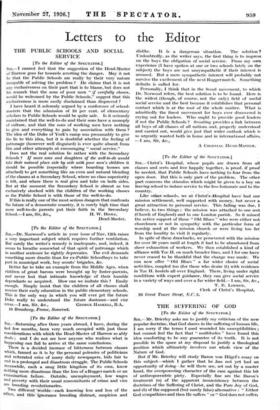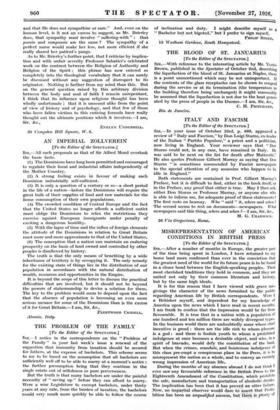THE SUFFERING OF GOD [To the Editor of the SPECTATOR.]
SIR,—Mr. Brierley asks me to justify my criticism of the now popular doctrine, that God shares in the suffering of human life. I am sorry if the terms I used wounded his susceptibilities ; but cannot feel the fact that " multitudes " have found this idea comforting to be any guarantee of its truth. It is not possible in the space at my disposal to justify a theological Position which ultimately involves our whole view of the Nature of God.
But if Mr. Brierley will study Baron von Hfigers essay on this subject—which I gather that he .has not yet had an opportunity of doing—he will there see, set out by a master hand, the overpowering character of the case against this bit of anthropocentric piety. Especially fine are the Baron's treatment (a) of the apparent inconsistency between the doctrines of the Suffering of Christ, and the Pure Joy of God, and (b) of the supposed (but surely false) alternative : " Either God svmpathiSes and then He suffers " or " God does not suffer, and that He does not sympathise or care." And, even on the human level, is it not an excess to suggest, as Mr. Brierley does, that sympathy must involve " suffering-with'' : that passio and compassio are the same ? The -sympithy of a perfect nurse would make her less, not more efficient if she really shared her patient's pangs.
As to Mr. Brierley's further point, that I criticize by implica- tion and with unfair severity Professor Sabatier's celebrated work on the contrast between the Religion of Authority and Religion of the Spirit ; this phrase has now entered so completely into the theological vocabulary that it can surely be discussed without any suggestion of disrespect to its originator. Nothing is farther from my mind than this. But on the general question raised by this arbitrary division between the body and soul of faith I remain unrepentant. I think that its influence upon religious thought has been wholly unfortunate that it is unsound alike from the point of view of history and of psychology, and that few of those who have fallen victims to this enticing formula have really thought out the ultimate positions which it involves.—I am, Sir, &c., EVELYN UNDERHILL. 50 Campden Hill Square, W. 8.



















































 Previous page
Previous page